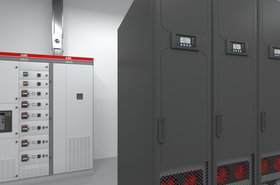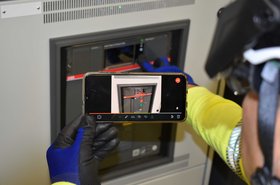Today, data centers are hot property, both figuratively and literally. Having been dubbed ‘the crude oil of the 21st century’, data is big business, with the global data center market projected to reach $517.17 billion by 2030.
But as our insatiable appetite for always-on, always-accessible data continues to grow, so do the power densities in the facilities where this data resides. More power to the data center means more heat; more heat means more cooling; and, more cooling means more cost and, generally, a less sustainable operation.
With cooling accounting for anywhere between 30-60 percent of data center’s total energy bill, as temperatures continue to rise, this poses quite the conundrum for cost and environmentally conscious data center managers.
The bigger picture
To improve efficiencies in any part of the data center, a holistic approach is essential. Once upon a time, across the industry, processes were highly siloed, relying heavily on manual maintenance and human intervention to function. There was very little insight into how one action might affect another aspect or area of the facility, and trial and error was a common – incredibly costly and incredibly time consuming – practice.
“In this new digital world, everything needs to be connected,” says Madhav Kalia, global head of Data Center Automation at ABB. “You need to be able to collect information from the entire facility. Without one integrated scenario this will become more and more difficult.”
Evolving from ‘nice to have’ to necessity in recent years, the traditional silos and legacy systems of old – still operational in some facilities – are no longer viable, with many operators instead opting for a single pane of glass solution.
“The data centers still operating in this siloed way will fall behind, we can already see that trend. The cost of running and maintaining several separate systems at once is prohibitive,” says Kalia.
For more than 20 years, ABB has led the way as a global automation and controls company, having transferred that experience and expertise into the data center infrastructure management space.
Encompassing various infrastructure management solutions – the likes of DCIM, BMS, EPM energy monitoring, and energy management – ABB AbilityTM Data Center Automation brings everything together. This helps data center managers simplify and make sense of an otherwise incredibly complex, potentially siloed environment, providing them with a single, truly holistic, scalable system.
“The system operates in real time and it knows exactly where every kilowatt is going. It monitors everything. It's quite normal for a mid-size data center to have anywhere between 80,000 and 200,000 monitoring points. Some bigger data centers will be on 500,000 or beyond, which you monitor in real time,” says Kalia.
A proven solution across several mission critical industries, such as mining, oil and gas, metals, pulp and paper, food and beverage, marine, chemicals, power plants and cement, ABB’s 800xA system has certainly cemented the company’s leadership in distributed control systems (DCS).
And, of course, not all data centers are created equal. Thanks to ABB’s diverse team and a global footprint spanning multiple industries, this solution can be adapted and configured to the unique needs of each facility, regardless of its geographic location.
Connectivity is key
Connectivity is undoubtedly one of the secrets to success within a data center environment. So that being said, why are there still so many outdated legacy systems and siloed approaches to data center management in operation today? Is it a case of sticking to what you know, despite the disadvantages? Or is the thought of a complete system overhaul just too much to bear?
“Most of the time in data centers, they don't have the capability in their teams to do integration with various different subsystems, that normally goes to the vendors who supplied it. So one of the biggest challenges in the data center industry today is how to connect,” says Kalia.
Luckily, ABB’s flexible, vendor agnostic ABB Ability Data Center Automation platform is easily integrated into an overall solution, enabling customers to buy their preferred best of breed equipment and, most importantly, connect it all together.
“The ABB Ability Data Center Automation solution is designed by default to connect to everything, but at the same time, not just connect to a specific type of equipment. All data in the same time series is collected right from the grid connection to the end of the rack, and everything is monitored at the same level,” says Kalia.
Better together
Once data center managers have overcome the connectivity hurdle, an optimized link to ABB’s Data Center Automation solution provides the ABB Ability™ Genix Industrial Analytics and AI Suite access to the entire scope of data. So whether you are trying to run modelling or optimization algorithms on top of it for different parts of your data center, want to run predictive maintenance, or perhaps come up with a maintenance strategy for your entire site, with ABB Ability Genix, optimization is your oyster.
This kind of insight is particularly useful when it comes to cooling. Typically in a data center, you have two separate cooling cycles running on two separate systems. One provides chilled water to the chiller system, and the other distributes this around the facility to wherever it’s needed.
What’s important for cooling optimization is that operators have a view of both the upstream chiller cycle as well as the distribution system, with a view as to how one will affect the other. There have been solutions on the market that look at either one or the other, but very few provide this valuable insight into both.
Without a holistic view, if an operator tries to optimize the chilled water cycle for energy saving, for example, that could make the distribution system sub-optimal, or vice versa. Something ends up having to give.
Yet, via a combination of this holistic view, alongside ABB Ability Genix’s carefully trained AI and ML algorithms, the data generated from all monitoring systems in the data center can be tracked and analyzed, enabling data center managers to make better informed decisions off the back of that data. This kind of insight is invaluable when it comes to planning and maintenance, essentially helping you future-proof your facility.
And thanks to the input data and deep analytics used to form and train these complex AI and ML algorithms, ABB Ability Genix knows how your system should be operating. If the system picks up on any anomalies or notices cooling isn’t happening the way it should be, it will adjust accordingly, either independently, or by first informing management so they can decide what to do.
Even for relatively new data centers using the best of breed equipment, there is always room for improvement. Inefficiencies or issues aren’t always immediately obvious, and what might get missed by man, certainly won’t be missed by machine.
“In these newer facilities we can see the IT load is kind of on standby, but the cooling load keeps going up, which isn’t right. So by doing deep analytics first we can almost always figure out a lot of areas where you can improve the running of the existing system.”
#Goals
Just like the systems in a data center, actions have consequences, and before you act, it’s useful (not to mention cost-effective) to know what those consequences might be.
By performing deep data analytics, ABB’s automation platform, in tandem with ABB Ability Genix, acts as a crystal ball, with the ability to predictively analyze power utilization during cooling and chilling processes to develop the best cooling optimization models for your facility.
Thanks to how these platforms are trained, they can achieve 95 percent accuracy, ultimately leading to a potential 10 percent reduction in cooling load, resulting in a lower PUE (power usage effectiveness). This has a particularly positive business consequence, given that 79 percent of enterprises rate sustainability as a key factor when evaluating their data center provider, according to a report from 451 Research.
And it’s not just the efficiency of equipment that can be improved, but the human element too. The ability to monitor an entire data center in real-time, via one solution, mitigates the need to find the skills otherwise needed to operate multiple different systems.
The automation of processes also helps increase the productivity and safety of existing staff, enabling them to reallocate their time to higher-level, less risky tasks, not to mention the scope for reduced human error. After all, every wasted minute, kilowatt or mistake ultimately affects the bottom line.
To ensure your facility is operating at its best, ABB has built and continues to build on its extensive expertise in this domain: developing cutting-edge solutions that enable data center operators and managers to not only enhance their competitive edge, but reduce running costs and improve their return on investment through the delivery of safer, smarter, more sustainable operations.
Interested in finding out more about how artificial intelligence (AI), machine learning (ML) and advanced analytics can help optimize energy use and reduce a facility’s carbon footprint? Check out ABB’s pilot project in Singapore here.
More...
-

ABB adds PowerExchanger feature to ease UPS battery sharing
Fast Frequency Response just got faster
-

Next-gen data centers need medium-voltage UPSs and fuel cells
As data centeres grow larger, a move from low to medium voltage is a natural step
-

ABB offers augmented reality for remote support
Closer and Raise products let local engineers access remote help

